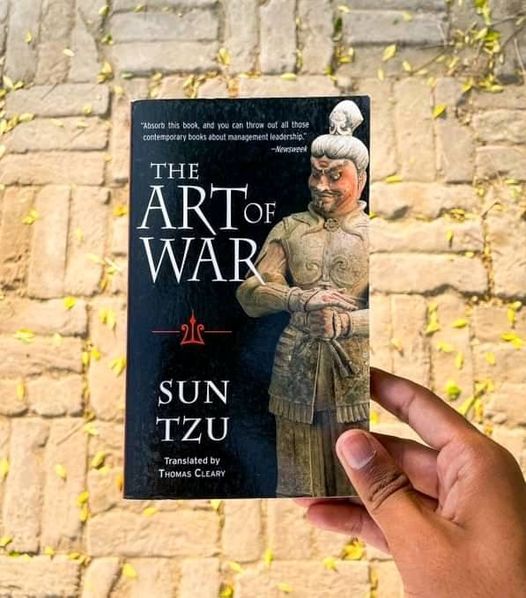Discover the enduring wisdom of Sun Tzu's The Art of War in Ten Lessons, offering invaluable insights for contemporary success.
"Sun Tzu's 'The Art of War' stands as a timeless testament to the enduring power of strategy and leadership. In 'Ten Lessons from The Art of War,' the author embarks on a captivating exploration of Sun Tzu's ancient wisdom, distilling invaluable insights that continue to resonate across centuries and cultures. As we journey through the pages of this transformative text, we uncover the timeless principles that underpin success in both warfare and everyday life.
At the outset, the book introduces us to Sun Tzu, the enigmatic Chinese military strategist whose profound teachings have left an indelible mark on history. Through his masterpiece, 'The Art of War,' Sun Tzu imparts a wealth of strategic wisdom that transcends the battlefield, offering invaluable lessons in leadership, decision-making, and conflict resolution. As we delve into the intricacies of Sun Tzu's philosophy, we are confronted with the stark realization of its universal applicability, resonating across diverse domains ranging from business to personal development.
With each lesson gleaned from 'The Art of War,' readers are invited to reflect on its relevance in navigating the complexities of modern-day challenges. Whether devising a business strategy, negotiating a deal, or confronting personal obstacles, Sun Tzu's timeless wisdom offers a guiding light to illuminate the path to success. Through the pages of 'Ten Lessons from The Art of War,' readers are empowered to harness the principles of strategy and leadership to achieve victory in the battlefield of life." 5 Life Lessons and 10 Transformational Quotes from the Book Surrounded by Idiots
1. The Importance of Strategy
"In war, the way is to avoid what is strong and to strike at what is weak."
This lesson emphasizes the significance of strategic thinking. The author beautifully illustrates how this principle can be applied to everyday decision-making, urging readers to identify strengths and weaknesses in any situation.
2. Adaptation and Flexibility
"All warfare is based on deception."
Sun Tzu's notion of deception encourages adaptability. The author elucidates how the ability to adapt and change course can be a valuable asset in our ever-evolving world.
3. The Value of Preparation
"The opportunity to secure ourselves against defeat lies in our own hands, but the opportunity of defeating the enemy is provided by the enemy himself."
Preparation is key, and this lesson teaches us the importance of being proactive and well-prepared, whether in battle or in life.
4. The Art of Leadership
"Leadership is a matter of intelligence, trustworthiness, humaneness, courage, and sternness."
This lesson delves into Sun Tzu's perspective on leadership qualities, offering valuable insights for anyone seeking to lead with wisdom and integrity.
5. The Power of Unity
"When you surround an army, leave an outlet free. Do not press a desperate foe too hard."
The importance of unity and maintaining harmony within a team is explored here. The author demonstrates how cohesion can be a source of strength.
6. Understanding Your Opponent
"If you know the enemy and know yourself, you need not fear the result of a hundred battles."
This lesson underscores the significance of self-awareness and understanding one's competition, a principle applicable not only in warfare but also in business and personal relationships.
7. Timing and Patience
"Opportunities multiply as they are seized."
Patience is a virtue, and this lesson encourages us to be patient and seize opportunities when the timing is right, rather than rushing into action.
8. The Art of Diplomacy
"In war, the way is to avoid what is strong and to strike at what is weak."
The author beautifully illustrates how diplomacy and negotiation can be powerful tools for conflict resolution, inspired by Sun Tzu's wisdom.
9. The Importance of Intelligence
"All warfare is based on deception."
This lesson highlights the role of intelligence and information in decision-making, emphasizing the value of gathering and using knowledge strategically.
10. The Long-Term Perspective
"All warfare is based on deception."
The final lesson reminds us of the importance of thinking beyond the immediate battle, focusing on long-term goals and sustainability.
Conclusion
In "Ten Lessons from The Art of War," the author skillfully combines Sun Tzu's ancient wisdom with contemporary examples, making the text accessible and relatable to a modern audience. While the lessons are thought-provoking and practical, the book could benefit from a more extensive exploration of each principle and its application in today's world.
Overall, "Ten Lessons from The Art of War" is an engaging and enlightening read for anyone seeking to gain a deeper understanding of strategy, leadership, and decision-making. Sun Tzu's timeless wisdom continues to serve as a valuable guide in our complex and ever-changing world.














COMMENTS